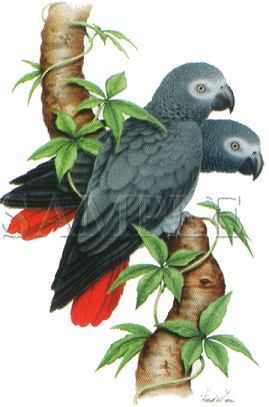Please Help our Pets by Donating One Dollar
African grey parrots are highly intelligent birds
often recognized for their ability to talk.
African grey parrots are able to learn a sizeable amount
of different words, can talk in different voices, and
speak in different languages. They can identify objects,
colors, materials and even count.
Because of their high intelligence, the African grey parrots
are easily trained. The biggest problem with having
an African grey parrot as a bird is.....you'd better
be careful what you say....they are very good at
mimicking your words!
Congo greys are silver or light gray in color with bright red tail
feathers and black beaks. Timnehs have a maroon colored tail
and reddish beaks. King Jackos have an unusual amount of red
feathers.
Facts about African grey parrots
African greys can live from 50-60 years
They are approximately 10"-14" in length
Provide a birdbath 2-3 times per week.
African greys can cause allergic reactions in some people.
African grey parrots are sensitive to smoke and strong odors
Perches of differing widths, diameters and textures are
necessary to help keep the bird's feet healthy
A variety of toys are needed
Cages should be away from drafts, open windows and the kitchen
Cages need to be covered at night to prevent drafts
Minimum cage size is 32"W x 32"L x 48"H
African greys need to be let out of their cages for socialization
Feather picking is an undesirable habit the birds seem to enjoy doing
African grey parrots can be kept as a single pet with good results
African grey parrots live in the wild in forests in Africa
What to Feed African Grey Parrots
African greys need 3-4 teaspoons per day of a pellet or
seed-based, fortified parrot diet.
About 5-10% of an African grey parrot's diet should be bite-sized
fruits and veggies like oranges, melon, apples, sweet potatoes,
broccoli, spinach, mustard greens and shredded carrots. Offer
daily or every 2-3 days.
A vitamin and mineral supplement may be mixed with fruits and
veggies once a week.
Parrots should always have access to clean, fresh water in a
bowl. Don't use tap water. We recommend Steam Distilled water
for it's purity.
See Also:
Our Recommendation for Food
for African Grey Parrots
Signs an African grey parrot is Healthy
Clear, bright eyes
Clean, smooth feathers
Eats throughout the day
Normal droppings that are not runny for more than a couple of
days
A curious and active disposition
Signs an African grey parrot may be getting sick
Decreased appetite; weight loss
Decreased activity and grooming behavior
Change in droppings in excess of two days
Discharge from nose or mouth; sneezing
Feathers fluffed for prolonged periods of time
Sitting at the bottom of cage
Picture African Grey Parrots

Totally Loveable Stuffed Plush Parrots & Birds
Magnificently Colored Parrot Calendars